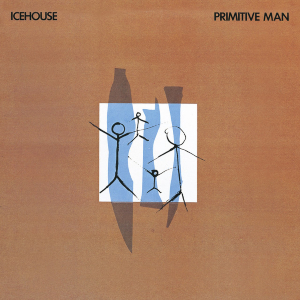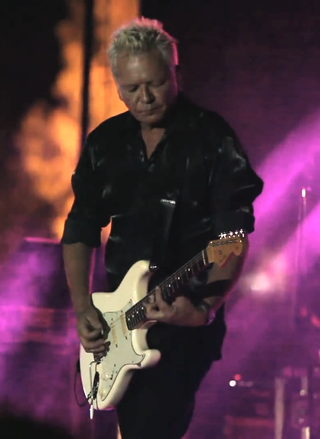See also
- Terra Australis, meaning "southern land"; name given to a hypothetical continent which appeared on European maps between the 15th and 18th centuries
Great Southern Land may refer to:
Icehouse or ice house may refer to:

Guy Adam Pratt is a British bassist. He has worked with artists including Pink Floyd, Roxy Music, Gary Moore, Madonna, Peter Cetera, Michael Jackson, the Smiths, Robert Palmer, Echo & the Bunnymen, Tears for Fears, Icehouse, Bananarama, Iggy Pop, Tom Jones, Debbie Harry, Whitesnake, Womack & Womack, Kirsty MacColl, Coverdale•Page, Lemon Jelly, the Orb, All Saints, Stephen Duffy, Robbie Robertson and A. R. Rahman.

Icehouse are an Australian rock band, formed in Sydney in 1977 as Flowers. Initially known in their homeland for their pub rock style, the band later achieved mainstream success playing new wave and synth-pop music and attained Top 10 singles chart success locally and in both Europe and the U.S. The mainstay of both Flowers and Icehouse has been Iva Davies supplying additional musicians as required. The name "Icehouse", adopted in 1981, comes from an old, cold flat Davies lived in and the strange building across the road populated by itinerant people.

Primitive Man, the second studio album by Australian rock band Icehouse, was released on 20 September 1982. In January 1982, Icehouse founder Iva Davies started recording Primitive Man essentially as a solo project. It was co-produced with Keith Forsey, who later worked with Simple Minds and Billy Idol. Forsey supplied additional percussion; Davies supplied vocals, lead guitar, keyboards, bass guitar and programmed the Linn drum machine. Released as an Icehouse album, Primitive Man reached number 3 on the National album charts and provided their international breakthrough single, "Hey Little Girl", which peaked at number 7 in Australia, number 2 in Switzerland, number 5 in Germany, the top 20 in UK, Sweden and Netherlands, and number 31 on the US Billboard Mainstream Rock chart. Another single "Great Southern Land" made the Australian top 5; it was later featured in the 1988 Yahoo Serious film Young Einstein, and remains their most popular song according to listeners of Triple M in 2007. To promote Primitive Man on tour, Davies re-assembled Icehouse with Michael Hoste (keyboards) and John Lloyd (drums), and new members: Bob Kretschmer, Guy Pratt and Andy Qunta.

"Electric Blue" is a song by Australian rock band Icehouse. It was co-written by Iva Davies of Icehouse and John Oates of US band Hall & Oates. Oates became involved with Davies after contacting him to state he was a fan. The resulting collaboration produced this song and Oates has stated that if Davies had not released the song under the Icehouse name, then it would have been a Hall & Oates track.

Ivor Arthur Davies, AM, known professionally as Iva Davies, is an Australian singer, songwriter, composer, multi-instrumentalist and record producer.
A greenhouse is an indoor covered place where plants are grown and cultivated. It may also refer to:

"Great Southern Land" is a song by Australian rock band Icehouse. It was released on 9 August 1982 as the lead single from their second studio album Primitive Man. It peaked at No. 5 on the Australian Singles Chart, it was later featured in the 1988 Yahoo Serious film Young Einstein, and remains their most popular songs according to listeners of Triple M in 2007.

Great Southern Land is the first compilation album by Australian rock/synthpop band Icehouse, released by Chrysalis Records / Regular Records in October 1989. It peaked at No. 2 on the Australian albums charts, and contained two new singles "Touch the Fire", which peaked at No. 13 on the singles chart, and "Jimmy Dean", which peaked at No. 47. Several different versions of this album exist; the Regular Records release for Australian / New Zealand markets was as a 16 track double vinyl LP, twin music cassette or CD; Chrysalis Records US versions were as 10 track LP / music cassette or 11 track CD release with a different track order; Chrysalis Records UK versions had 12 tracks ; and a video version of 15 tracks was released in VHS PAL format.

Masterfile is the second compilation album by the Australian rock band, Icehouse. The album covers material from the band's first album Icehouse (1980) to Measure for Measure (1986). It also has a re-recorded version of the band's 1981 single, "Love In Motion", with Christina Amphlett of Divinyls.

Meltdown is a remix album by Australian rock synthpop band, Icehouse with tracks remixed by Australian electronic musicians and bands including Infusion, sonicanimation and beXta. It was released in October 2002 within Australia by dIVA Records under Warner Music Australia. The single "Lay Your Hands on Me" peaked at #85 on the Australian singles chart.

"Hey Little Girl" is a single released by Australian band Icehouse, the second single from the band's 1982 album, Primitive Man. The album and single were co-produced by band member and the track's writer, Iva Davies, and Keith Forsey. It was released in November 1982 on Regular Records in 7" vinyl single and 12" vinyl single formats. UK and Europe releases by Chrysalis Records were also on 7" and 12" formats, but with different track listings. The single was then released in the US in 1983 on the same formats. On "Hey Little Girl", Iva Davies uses the Linn drum machine—the first for an Australian recording. It peaked at No. 7 on the Australian singles chart and No. 2 in Switzerland, No. 5 in Germany, Top 20 in UK, Sweden and Netherlands, and No. 31 on the Billboard Mainstream Rock chart.
Heroes or Héroes may refer to:
The discography of Icehouse, an Australian rock and synthpop band, includes releases under the earlier band name, Flowers, which was formed in 1977 by the mainstay Iva Davies, and was renamed Icehouse in 1981; material was also released by "Iva Davies and Icehouse". Flowers or Icehouse have released seven studio albums, one soundtrack album, as well as four remix albums and forty-one singles.
Love in Motion may mean:
Australian pop music awards are a series of inter-related national awards that gave recognition to popular musical artists and have included the Go-Set pop poll (1966–1972); TV Week King of Pop Awards (1967–1978); TV Week and Countdown Music Awards (1979–1980); the Countdown Awards (1981–1982) and Countdown Music and Video Awards (1983–1987). Early awards were based on popular voting from readers of teenage pop music newspaper Go-Set and television program guide TV Week. They were followed by responses from viewers of Countdown, a TV pop music series (1974–1987) on national broadcaster Australian Broadcasting Corporation (ABC). Some of the later award ceremonies incorporated listed nominees and peer-voted awards. From 1987 the Australian Recording Industry Association (ARIA) instituted its own peer-voted ARIA Music Awards.
Anderson Amos Temba "Andy" Qunta is an English singer, songwriter, composer and musician. In a career spanning more than 40 years, Qunta is best known as the keyboardist of the Australian rock band Icehouse from between 1982 and 1988. As a popular musician, he has been influenced by artists including the Who, Cliff Richard, Jimi Hendrix, Genesis, Manfred Mann, Yes, Todd Rundgren and Queen.

White Heat: 30 Hits is a two-disc compilation album by Australian rock band Icehouse, released on 26 August 2011 in Australia. While it is technically their third best-of compilation, following 1989's Great Southern Land and 1992's Masterfile, it is the first such compilation spanning the band's entire career, including both their early- to mid-1980s hits and material from their most commercially successful period, beginning with the studio album Man of Colours (1987).

Fire Fight Australia was a fundraising benefit concert held on Sunday, 16 February 2020, as a means for raising funds for the national bushfire relief following the 2019–20 Australian bushfire season, known as the 'Black Summer'. It was held at ANZ Stadium in Sydney, Australia. It ran for 10 hours and was broadcast live on television by the Seven Network and Foxtel. A related album by various artists, Artists Unite for Fire Fight: Concert for National Bushfire Relief was released by Sony in March.

"My Obsession" is a song by Australian rock band Icehouse, which was released in 1987 as the third single from their sixth studio album Man of Colours. The song was written by Iva Davies and Robert Kretschmer, and produced by David Lord. "My Obsession" peaked at No. 12 on Australia's Kent Music Report chart and No. 88 on the US Billboard Hot 100.